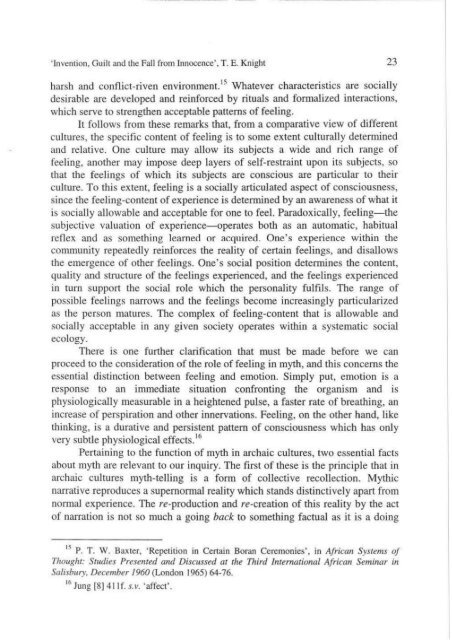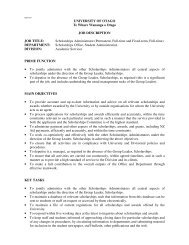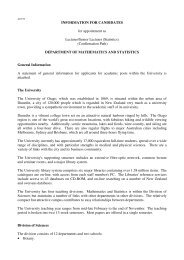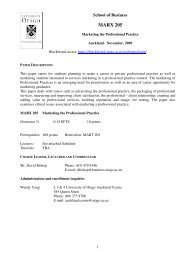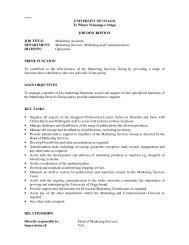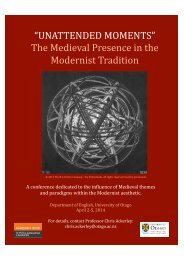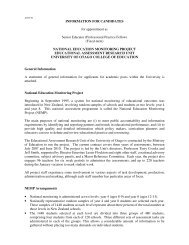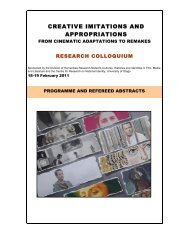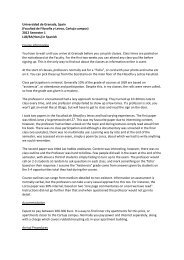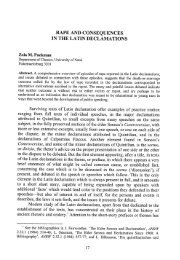scholia - University of Otago
scholia - University of Otago
scholia - University of Otago
You also want an ePaper? Increase the reach of your titles
YUMPU automatically turns print PDFs into web optimized ePapers that Google loves.
'Invention, Guilt and the Fall from Innocence', T. E. Knight<br />
harsh and conflict-riven environment. 15 Whatever characteristics are socially<br />
desirable are developed and reinforced by rituals and formalized interactions,<br />
which serve to strengthen acceptable patterns <strong>of</strong> feeling.<br />
It follows from these remarks that. from a comparative view <strong>of</strong> different<br />
cultures, the specific content <strong>of</strong> feeling is to some extent culturally determined<br />
and relative. One culture may allow its subjects a wide and rich range <strong>of</strong><br />
feeling, another may impose deep layers <strong>of</strong> self-restraint upon its subjects, so<br />
that the feelings <strong>of</strong> which its subjects are conscious are particular to their<br />
culture. To this extent, feeling is a socially articulated aspect <strong>of</strong> consciousness,<br />
since the feeling-content <strong>of</strong> experience is determined by an awareness <strong>of</strong> what it<br />
is socially allowable and acceptable for one to feel. Paradoxically, feeling-the<br />
subjective valuation <strong>of</strong> experience-operates both as an automatic, habitual<br />
reflex and as something learned or acquired. One's experience within the<br />
community repeatedly reinforces the reality <strong>of</strong> certain feelings, and disallows<br />
the emergence <strong>of</strong> other feelings. One's social position determines the content,<br />
quality and stmcture <strong>of</strong> the feelings experienced, and the feelings experienced<br />
in tum support the social role which the personality fulfils. The range <strong>of</strong><br />
possible feelings narrows and the feelings become increasingly particularized<br />
as the person matures. The complex <strong>of</strong> feeling-content that is allowable and<br />
socially acceptable in any given society operates within a systematic social<br />
ecology.<br />
There is one further clarification that must be made before we can<br />
proceed to the consideration <strong>of</strong> the role <strong>of</strong> feeling in myth, and this concerns the<br />
essential distinction between feeling and emotion. Simply put, emotion is a<br />
response to an immediate situation confronting the organism and is<br />
physiologically measurable in a heightened pulse, a faster rate <strong>of</strong> breathing, an<br />
increase <strong>of</strong> perspiration and other innervations. Feeling, on the other hand, like<br />
thinking, is a durative and persistent pattern <strong>of</strong> consciousness which has only<br />
very subtle physiological effects. 16<br />
Pertaining to the function <strong>of</strong> myth in archaic cultures, two essential facts<br />
about myth are relevant to our inquiry. The first <strong>of</strong> these is the principle that in<br />
archaic cultures myth-telling is a form <strong>of</strong> collective recollection. Mythic<br />
narrative reproduces a supernonnal reality which stands distinctively apart from<br />
normal experience. The re-production and re-creation <strong>of</strong> this reality by the act<br />
<strong>of</strong> narration is not so much a going back to something factual as it is a doing<br />
15 P. T. W. Baxter, 'Repetition in Certain Boran Ceremonies', in African Systems <strong>of</strong><br />
7lwught: Studies Presented and Discussed at the Third International African Seminar in<br />
Salisbury, December 1960 (London 1965) 64-76.<br />
16 Jung [8) 411 f. s. v. 'affect'.<br />
23


